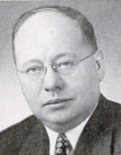| |||||||||||||||||
| |||||||||||||||||
 County results Curtis: 50–60% 60–70% 70–80% Conrad: 50–60% | |||||||||||||||||
| |||||||||||||||||
| Elections in Nebraska |
|---|
 |
The 1960 United States Senate election in Nebraska took place on November 8, 1960. Incumbent Republican Senator Carl Curtis ran for re-election to a second term. He was initially set to face Governor Ralph G. Brooks, the Democratic nominee, but two months before the election, Brooks died and was replaced on the ballot by Robert B. Conrad, Brooks's administrative assistant. [1] Curtis defeated Conrad in a landslide, but by a reduced margin from 1954, and slightly underperformed Republican presidential nominee Richard Nixon, who won Nebraska by 24% in the presidential election.

